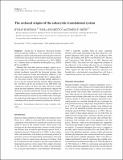The archaeal origins of the eukaryotic translational system
Author(s)
Hartman, Hyman; Favaretto, Paola; Smith, Temple F.
DownloadARCH.2006.431618.pdf (3.969Mb)
PUBLISHER_CC
Publisher with Creative Commons License
Creative Commons Attribution
Terms of use
Metadata
Show full item recordAbstract
Among the 78 eukaryotic ribosomal proteins, eleven are specific to Eukarya, 33 are common only to Archaea and Eukarya and 34 are homologous (at least in part) to those of both Bacteria and Archaea. Several other translational proteins are common only to Eukarya and Archaea (e.g., IF2a, SRP19, etc.), whereas others are shared by the three phyla (e.g., EFTu/EF1A and SRP54). Although this and other analyses strongly support an archaeal origin for a substantial fraction of the eukaryotic translational machinery, especially the ribosomal proteins, there have been numerous unique and ubiquitous additions to the eukaryotic translational system besides the 11 unique eukaryotic ribosomal proteins. These include peptide additions to most of the 67 archaeal homolog proteins, rRNA insertions, the 5.8S RNA and the Alu extension to the SRP RNA. Our comparative analysis of these and other eukaryotic features among the three different cellular phylodomains supports the idea that an archaeal translational system was most likely incorporated by means of endosymbiosis into a host cell that was neither bacterial nor archaeal in any modern sense. Phylogenetic analyses provide support for the timing of this acquisition coinciding with an ancient bottleneck in prokaryotic diversity.
Date issued
2005-11Department
Massachusetts Institute of Technology. Department of Biological Engineering; Massachusetts Institute of Technology. Department of Earth, Atmospheric, and Planetary SciencesJournal
Archaea
Publisher
Hindawi Publishing Corporation
Citation
Hartman, Hyman, Paola Favaretto, and Temple F. Smith. “The Archaeal Origins of the Eukaryotic Translational System.” Archaea 2, no. 1 (2006): 1–9. © 2006 Hindawi Publishing Corporation
Version: Final published version
ISSN
1472-3646
1472-3654